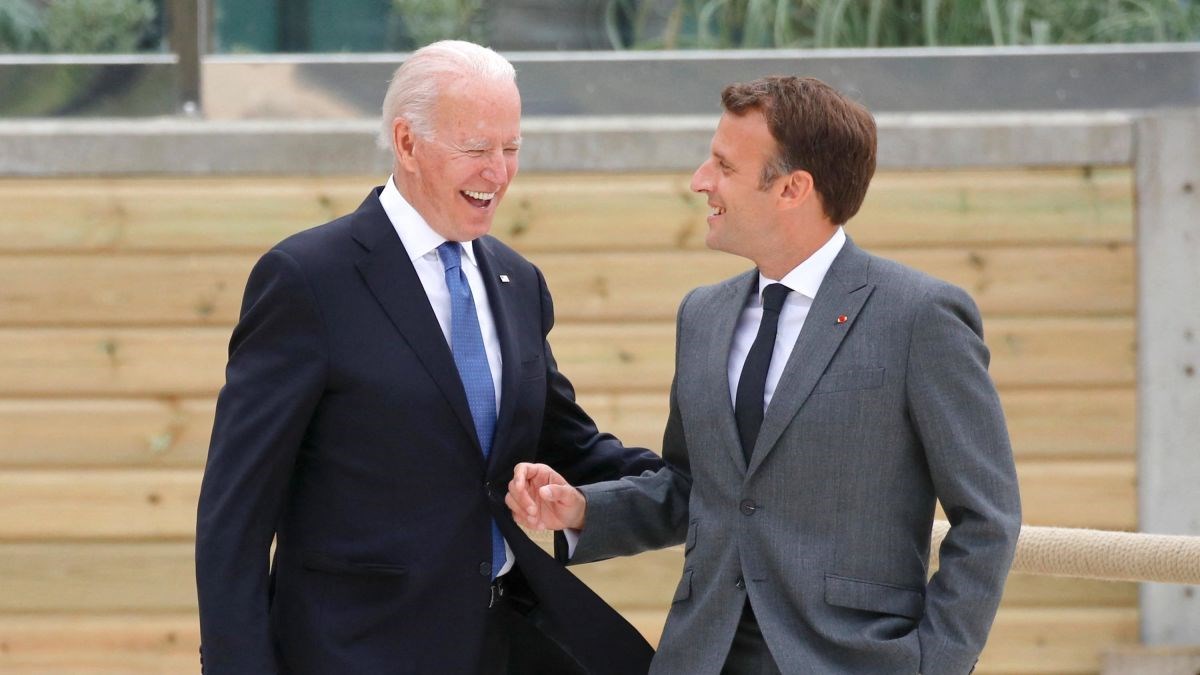Macron tells Biden that UAE, KSA can barely raise oil output
French President Emmanuel Macron informed his American counterpart that the two top OPEC oil producers will not fully increase oil production.
-

US President Joe Biden and French President Emmanuel Macron
The Crown Prince of the United Arab Emirates, Sheikh Mohammed bin Zayed (MbZ), told French President Emmanuel Macron on Monday that two top OPEC oil producers, Saudi Arabia and the United Arab Emirates, can barely increase oil production.
"I had a call with MbZ," Macron was heard telling US President Joe Biden on the sidelines of the G7 summit.
"He told me two things. I'm at a maximum, maximum (production capacity). Second, he told me...the Saudis can increase a little bit, 150 (thousands of barrels per day) or a little bit more. They don't have huge capacities at this stage," Macron said.
Read next: Biden to meet MBS in Saudi Arabia mid-July
Brent oil prices rose more than $2 per barrel as a result of the news, reaching more than $115 per barrel amid tight global supplies and rising demand.
Saudi Arabia and the United Arab Emirates have been viewed as the only two countries in the world's producer group, the Organization of Petroleum Exporting Countries, that have some spare capacity and could help increase global deliveries.
Nonetheless, the West is looking for ways to cut Russian oil imports in order to "punish" Moscow for its military operation in Ukraine.
Saudi Arabia currently produces 10.5 million BPD and has a nameplate capacity of 12.0 million-12.5 million BPD, allowing it to increase output by 2 million.
The UAE produces approximately 3 million BPD, has a capacity of 3.4 million, and is working to increase it to 4 million BPD.
Macron stated that it would be good for oil markets if both OPEC heavyweights could barely raise output.
Europe is looking for ways to replace up to 2 million BPD of Russian crude and 2 million BPD of refined products that were imported from Moscow prior to the military operation in Ukraine.
Read next: OPEC+ to prioritize oil production growth plan for June
In March, the UAE asked Western nations to be "reasonable" in their expectations, reiterating its commitment to the global OPEC+ energy alliance.
The Organization of the Petroleum Exporting Countries (OPEC), led by Saudi Arabia, and its ten partners, including Russia, have formed an "alliance to stay."
Despite rising requests to raise output to calm the turbulent oil market, UAE's Energy Minister Suhail Al-Mazrouei said it would be "difficult", with nations "facing a natural decline reduction," owing in large part to declining long-term investments in the oil business.
It is worth noting that Oil prices fell over 3% as investors are worried that the Federal Reserve's rate rises would send the US economy into recession, lowering demand for fuel.
Brent oil futures dropped $2.91, or 2.5 percent, to $111.74 a barrel. The global benchmark fell to $107.03, its lowest level since May 19.
West Texas Intermediate (WTI) crude oil in the United States decreased $3.33, or 3%, to close at $106.19 per barrel. The low for the session was $101.53, the lowest since May 11.
US running out of supply
Moreover, attempting to curve the prices of oil in the US, Washington has been actively using its Strategic Petroleum Reserve (SPR) for over a year. Bloomberg reported this news on Friday and highlighted that the government cannot continue to tap into the reserves in the long run.
Bloomberg’s report showed that the US has released about 115 million barrels throughout the past year. Since mid-May, approximately 1 million barrels have been released marking a new record-high.
At the current pace of oil production, the reserves will shrink to a 40-year low with only 358 million barrels remaining by the end of October. Last year, the SPR location in Texas and Louisiana reportedly contained 621 million barrels. According to official information, the US is set to stop extractions from SPR in October.
The report stated that “As the oil market looks today, it’s difficult to see how Washington can halt sales in October. Removing that additional supply would mean commercial inventories quickly deplete, putting upward pressure on oil prices.”

 4 Min Read
4 Min Read








